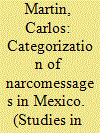| Srl | Item |
| 1 |
ID:
110852


|
|
|
|
|
| Publication |
2012.
|
| Summary/Abstract |
The current article brings together the conclusions of an exercise carried out in an attempt to analyze and classify narcopropaganda, or "narcomessages" in Mexico. The analysis and classification of narcomessages is able to provide some insights about the motivations underlying the increase of violent attacks in the country; at the same time, the classification of these messages can help in the identification of those groups that are more likely to influence public perception and support public policy measures against them.
|
|
|
|
|
|
|
|
|
|
|
|
|
|
|
|
| 2 |
ID:
110850


|
|
|
|
|
| Publication |
2012.
|
| Summary/Abstract |
In the first decade of the twenty-first century we are witnessing the emergence of a new form of counterterrorism in several democratic states. This new counterterrorism is ideological-religious in its rhetorical outlook, networked in its organizational structures, increasingly lethal in its operational tactics and more and more brutal in its methods. The shift to an ideological-religious discourse can be traced back to a conceptual transformation about the nature of terrorism, from the notion of terrorism as a "crime" to that as a "war". The latter, differently from the former, requires ideological justification, which in states with strong religious constituencies, such as the USA and Israel, can partially be sought and acquired on a religious basis. Second, the new counterterrorism is based on normalization of extra-judicial means in the fight against terrorism. This has happened at three levels: by creation of overt and covert extra-jurisdictional domains-or legal black holes-outside of the human rights regimes of democratic states, by legitimization of torture at political, intellectual and popular cultural levels and by increasingly widespread use of extra-judicial killings of terrorist suspects. Third, the tactics used by new counterterrorism agencies are increasingly lethal and lead to disproportionately high number of casualties among innocent civilians. This development is to a large extent due to hardening of traditional counterterrorism targets and use of imprecise technology and intelligence in operations. Finally, the new counterterrorism is networked and often beyond the control of the judicial sovereignty of courts. This is largely due to informal contacts developed within the framework of the post 9/11 extraordinary rendition program and outsourcing and privatization of counterterrorism related activities and the ensuing contractual arrangements between state institutions and private enterprises.
|
|
|
|
|
|
|
|
|
|
|
|
|
|
|
|
| 3 |
ID:
110849


|
|
|
|
|
| Publication |
2012.
|
| Summary/Abstract |
Ten years after 9/11, and after the death of Osama bin Laden, this article re-examines the early history of Al Qaeda-from its founding in August 1988 up until bin Laden's declaration of war against the United States in Afghanistan in 1996-by examining the group's aims, operations, alliances, finances, and administration during five distinct phases of the evolution of bin Laden's worldview. The authors argue that in assessing the formative years of bin Laden's organization, it is equally wrong to minimize the ambitions and organization of the early Al Qaeda as it is to telescope back from the Al Qaeda of the 9/11 attacks to argue that the group was organizing itself to wage a global Jihad from its inception. The authors outline how it was only a half decade later-after the group had decamped to Sudan, and after the U.S. had deployed troops in Saudi Arabia and Somalia-that al Qaeda shifted to conceiving its central mission as attacking American targets.
|
|
|
|
|
|
|
|
|
|
|
|
|
|
|
|
| 4 |
ID:
110851


|
|
|
|
|
| Publication |
2012.
|
| Summary/Abstract |
Studies of individuals or groups that use violence or terrorism in the pursuit of political goals typically focus on the specific actions that these individuals or groups have taken, or may take, and on the policies that defenders against such actions adopt in response. Comparatively less attention is devoted to the preconditions that may lead to the contemplation and commitment of such actions and how or why defenders may obviate these actions before they occur or why they may never occur. This case study is an examination of the politics of Quebec separatism, which looked set to follow a violent path in the 1960s and early 1970s, but ultimately did not, and explores why it did not.
|
|
|
|
|
|
|
|
|
|
|
|
|
|
|
|